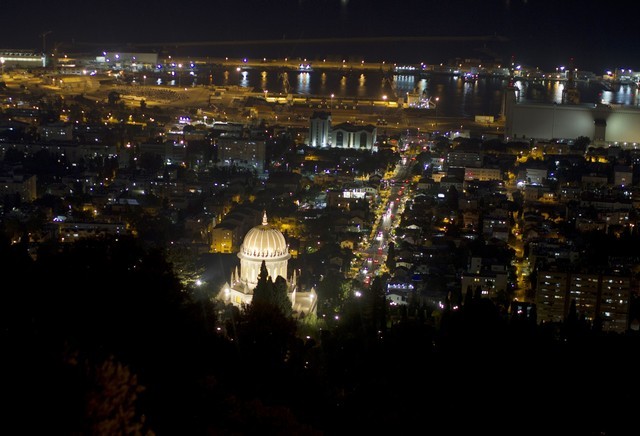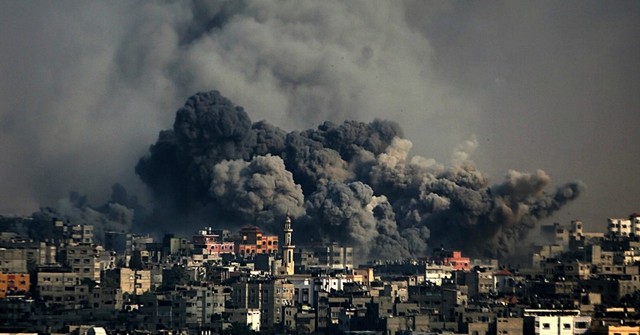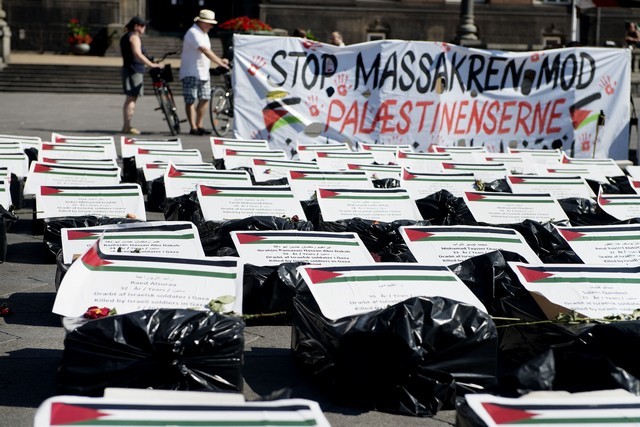By Eric Zuesse
We’ll go considerably farther than has yet been revealed by the professional intelligence community, to provide the actual evidence that conclusively shows that (and how) the Ukrainian Government shot down the Malaysian airliner, MH-17, on July 17th.
The latest report from the intelligence community was headlined on August 3rd by Robert Parry, “Flight 17 Shoot-Down Scenario Shifts,” and he revealed there that, “Contrary to the Obama administration’s public claims blaming eastern Ukrainian rebels and Russia for the shoot-down of Malaysia Airlines Flight 17, some U.S. intelligence analysts have concluded that the rebels and Russia were likely not at fault and that it appears Ukrainian government forces were to blame, according to a source briefed on these findings. This judgment — at odds with what President Barack Obama and Secretary of State John Kerry have expressed publicly — is based largely on the absence of U.S. government evidence that Russia supplied the rebels with a Buk anti-aircraft missile system that would be needed to hit a civilian jetliner flying at 33,000 feet, said the source, who spoke on condition of anonymity.”
It’s actually based on lots more than that; it’s based not on an absence of evidence, but on positive proof that the Ukrainian Government shot the plane down, and even proving how it was done. You will see this proof, right here, laid out in detail, for the first time.
The reader-comments to my July 31st article, “First Examination of Malaysian MH-17 Cockpit Photo Shows Ukraine Government Shot that Plane Down,” provided links and leads to independent additional confirmatory evidence backing up that account, of retired Lufthansa pilot Peter Haisenko’s reconstruction of this event, to such an extent that, after exploring the matter further, I now feel confident enough to say that the evidence on this matter is, indeed, “conclusive,” that Haisenko is right. Here is all of that evidence, which collectively convinces me that Haisenko’s conclusion there, is, indeed, the only one that can even possibly explain this wreckage:
“There have been two or three pieces of fuselage that have been really pockmarked with what almost looks like machine-gun fire, very very strong machine-gun fire.” This remarkable statement comes not from Haisenko, but from one of the first OSCE investigators who arrived at the scene of the disaster. Go to https://www.youtube.com/watch?v=7ze9BNGDyk4 and you will see it.
That youtube snippet in an interview with Michael Bociurkiw, comes from a man who is “a Ukrainian-Canadian monitor with the Organization for Security and Cooperation in Europe (OSCE), [who] has seen up close … the crash site of Malaysia Airlines Flight MH17. Bociurkiw and one other colleague were the first international monitors to reach the wreckage after the jet was shot down over a rebel-held region of eastern Ukraine July 17.” That description of him is from the lead-in to the full interview with him, at the 29 July 2014 CBC news article, “Malaysia Airlines MH17: Michael Bociurkiw talks about being first at the crash site .” The far briefer youtube clip shows only what’s presented on 6:10-6:24 of this CBC interview with Bociurkiw. The CBC reporter in the video precedes the interview by announcing, “The wreckage was still smoldering when a small team from the OSCE got there.” So: he had to have been there really fast. “No other officials arrived for days,” she said.
So: one of the two first international monitors on-site saw conclusive evidence that the Malaysian plane had been hit by “very very strong machine-gun fire,” not by ground-based missile-fire. Peter Haisenko’s reconstruction of the downing of that airliner, was here being essentially confirmed on-site by one of the two first OSCE international monitors to arrive on-site, while the wreckage was still smoldering . That’s as close to virgin, untouched evidence and testimony as we’ll ever get. Unlike a black-box interpretation-analysis long afterward by the Russian Government, or by the British Government, or by the Ukrainian Government, each of which governments has a horse in this race, this testimony from Bociurkiw is raw, independent, and comes from one of the two earliest witnesses to the physical evidence. That’s powerfully authoritative testimony, and it happens to confirm pilot Peter Haisenko’s theory of what happened. Bociurkiw arrived there fast because he negotiated with the locals for the rest of the OSCE team, who were organizing to come later: Bociurkiw speaks the local languages there — Ukrainian and Russian.
Furthermore, this is hardly testimony from someone who is supportive of the anti-Government rebels. Earlier, there had been this, http://pressimus.com/Interpreter_Mag/press/3492 , which transcribes the BBC’s interview with Bociurkiw on July 22nd. He said then: “We’re observing that major pieces, and I’m looking at the tail fin as I said, and then there’s also the rear cone section of the aircraft, they do look different than when we first saw them, … two days ago.” So, he had arrived on-scene July 20th at the latest. (Neither the BBC nor the CBC, both of which interviewed him, were sufficiently professional to have reported the specific date at which Bociurkiw had actually arrived on-scene, but, from this, it couldn’t have been after July 20th. The downing had occurred July 17th. If some of the debris was still “smoldering” as the CBC journalist said, then maybe he had arrived there even earlier.)
The youtube snippet of Bociurkiw came to me via a reader-comment to my article, from Bill Johnson, after which I web-searched the youtube clip for its source and arrived then at the 29 July 2014 CBC news article and its accompanying video.
Further, there’s this crucial 21 July photo-reconstruction of that cockpit-fragment positioned into place on the aircraft as it had originally been in that intact-airliner: https://twitter.com/EzraBraam . (Sometimes that doesn’t work, so here’s another screen of it from someone who copied it .) Looking at that photo-reconstruction, one can easily tell that the SU-25 or other fighter-jet that was firing into the cockpit from the pilot’s left side didn’t just riddle the area surrounding the pilot with bullets, but that it then targeted-in specifically onto the pilot himself, producing at his location a huge gaping hole in the side of the plane precisely at the place where the pilot was seated. Furthermore, this gaping hole was produced by shooting into the plane, precisely at the pilot, from below and to the pilot’s left, which is where that fighter-jet was located — not from above the airliner, and not from beside it, and also not from below it .
In other words: this was precise and closely-targeted firing against the pilot himself, not a blast directed broadly against, and aiming to hit, the plane anywhere, to bring it down.
Haisenko explained how this penetration of the plane, though it was targeted specifically at the pilot, caused immediately a breaking-apart of the entire aircraft.
Other readers have responded to my news-report about Haisenko’s article , by saying that shrapnel from a Buk missile could similarly have caused those holes into the side of the cockpit. However, that objection ignores another key feature of Haisenko’s analysis. Haisenko said there: “You can see the entry and exit holes. The edge of a portion of the holes is bent inwards. These are the smaller holes, round and clean, showing the entry points most likeley that of a 30 millimeter caliber projectile. The edge of the other, the larger and slightly frayed exit holes showing shreds of metal pointing produced by the same caliber projectiles. Moreover, it is evident that … these exit holes of the outer layer of the double aluminum reinforced structure are shredded or bent — outwardly!”
What this means is that in order to have some of those holes frayed inwardly and the other holes frayed outwardly, there had to have been a second fighter-jet firing into the cockpit from the airliner’s right-hand side. That’s critically important, because no ground-based missile (or shrapnel therefrom) hitting the airliner could possibly have produced firing into the cockpit from both sides of the plane. It had to have been a hail of bullets from both sides, that brought the plane down, in that circumstance. This is Haisenko’s main discovery, by his pointing that out. You can’t have projectiles going in both directions — into the left-hand-side fuselage panel from both its left and right sides — unless they are coming at the panel from different directions. Nobody before Haisenko had noticed that the projectiles had ripped through that panel from both its left side and its right side . This is what rules out any ground-fired missile.
Peter Haisenko posted an extremely high-resolution image from that photo which he used, and it shows unequivocally that some of the bullet-holes were inbound while others of them were outbound: Here it is, viewed very close-up .
Although the fighter jets that were said to have been escorting the Malaysian plane into the war-zone were alleged to be SU-25 planes, a different type might have been used. SU-25s are designed to be flown up to 23,000 feet without an oxygen-mask, but can go much higher if the pilot does wear that mask, which was probably the case here. Of course, an airliner itself is fully pressurized. That pressurization inside the airliner is, moreover, a key part of Haisenko’s reconstruction of this airliner’s downing. Basically, Haisenko reconstructs the airliner’s breaking apart as soon as that hail of bullets opened and released the plane’s pressurization.
The specific photo of that cockpit-fragment, which Haisenko had downloaded immediately after the disaster, was removed from the Internet, but other photos of this fragment were posted elsewhere, such as at the British publication (which, like the rest of the Western “news” media is slanted pro-Obama, anti-Putin), on July 21st, headlining their anti-Putin missile-theory bias, “MH17 crash: FT photo shows signs of damage from missile strike.” Their “reporters” opened with their blatant anti-Russian prejudice: “The first apparent hard evidence that Malaysia Airlines Flight MH17 was brought down by a surface-to-air missile is emerging from the crash site in eastern Ukraine, after experts confirmed on Monday there were signs of shrapnel damage to the aircraft.” Although they didn’t say in their opener that the “surface-to-air missile” was from the rebels, they made clear their pro-Ukrainian-Government anti-Russian bias by saying, “Over the weekend, western intelligence agencies pointed to mounting evidence that backs Ukraine’s claim that the aircraft with 298 people on board was shot down by mistake by pro-Russian separatists and Russian military personnel with an SA-11 missile launched from a Buk-M1 SAM battery.” Their stenographers (or as they would say “reporters”) stenographed (“reported”) that, “Douglas Barrie of the International Institute for Strategic Studies, said the photographic evidence ‘was consistent with the kind of damage you would expect to see from the detonation of a high explosive fragmentation warhead of the type commonly used in a SAM system’.” No analyst from the pro-Putin camp was interviewed by their “reporters.” For example, Russia’s Interfax News Service headlined on July 29th, the same day as the FT’s article, “Boeing’s downing by Buk missile system unlikely — military expert,” and they stenographed their “expert,” as follows:
Chief of the Russian Land Forces’ tactical air defense troops Maj. Gen. Mikhail Krush said he doubts that the Malaysian passenger liner was brought down by a Buk surface-to-air missile system. “No one observed a Buk engaging targets in that region on that day, which provides 95 percent proof that Buk systems were not used in this concrete case,” the general said in an interview with the Voyenno-Promyshlenny Kuryer military weekly to be published on Wednesday [July 30th]. “This is no more than a theory for now. However, a guided missile launched by a Buk missile system leaves behind a specific smoke trail as it flies, like a comet. In daylight this trail can be clearly seen within a radius of 20-25 kilometers from the missile system. It cannot remain unnoticed. There are no eyewitnesses to confirm there was any. No one reported a launch. This is one thing,” he said. “Second. The holes left by the strike elements on the Boeing’s outer skin indicate that the warhead blew up from below and sideways. A Buk missile strikes the target from above,” he said. “The damage done to the plane suggests that a different missile was used. Our guidance method is a zoom, when the missile strikes the target from above covering it with a thick cloud of fragments” the general said. “I cannot state categorically, guided by this data, but I can suggest, using my experience, that it was not a Buk missile that hit the Boeing,” the expert said.
General Krush’s statement can fit with Haisenko’s and with Bociurkiw’s, but not with FT’s or the rest of the “reporters” (just consider them as rank propagandists) in the West.
U.S. President Barack Obama has been saying all along that Russia — against which he is actually systematically building toward war — and not Ukraine (which he’s using as his chief vehicle to do that ), is to blame for this airliner-downing. Previously, he had said that the snipers who in February had killed many people at the Maidan demonstrations against the pro-Russian Ukrainian President Viktor Yanukovych came from Yanukovych’s State Security Service and not from the far-right political parties that were trying to bring Yanukovych down and that Obama’s agent Victoria Nuland selected to run the new Ukrainian government. But that too was an Obama lie . He lies a lot, and it’s just about the only type of statement he ever makes about Russia, and about Ukraine: lies.
If someone wants to verify how rabidly the U.S. Government lies, and has lied since at least the time of George W. Bush’s Presidency, just look at this video, by starting at 16:00 on it and going to 42:00 on it , and you will be shocked. (It pertains to lies by Bush that are still being covered up by Obama.) And when you further consider the many obvious questions it points out, which U.S. “news” media refused to ask and still refuse to ask about the matter, you’ll recognize that we are being lied to systematically and with utter contempt of the public, and with no respect for the public’s right to know the truth, even regarding massive history like that. It’s really brutal.
Ignorant “reporters” sometimes slip-up and include, in their stenography, facts that actually support the opposite side’s narrative of events and that discredit their own story-line. Such has been the case, for example, in the Financial Times piece, which included the statement that, “Anti-aircraft missiles are not designed to score a direct hit as they are targeted to destroy fast, agile fighter jets. Instead, they are designed to explode within about 20m of their target, sending out a cloud of red hot metal to increase the chances of inflicting as much damage as possible.”
But rather than merely “a cloud of red hot metal,” what actually brought down this plane was what Haisenko has said brought it down: magazines-full of carefully targeted rapid-fire machine-gun bullets pouring forth from below the plane, at both its left and right.
This was a Ukrainian Government job. It was close-in . (No missile fired from the distance more than 30,000 feet down to the ground could have been that precise to target the pilot rather than the far larger target of the plane’s entire body.) It came from the Government that Obama installed there in February and that’s now carrying out an ethnic-cleansing campaign against the residents in Ukraine’s southeast , the places where Yanukovych’s voters live ( to the extent that they still can and do live ).
Furthermore, note also that the shrapnel damage to that plane comes from above it, which is where missiles usually hit a plane from, releasing their shrapnel from above, down onto the plane. By contrast, the hail of bullets to the Malaysian plane’s pilot came from below the plane, aiming upward at the cockpit, from both sides of the cockpit.
As regards whether there were actually two fighter jets firing into the Malaysian airliner or only one, a proponent of the single-jet hypothesis, Bill Johnson, posted as a reader-comment to my article on August 4th , a series of extreme close-ups of the side-panel, in which he inferred that the explanation of the apparent left-side (pilot-side) bullets was probably the shape of the bullets. I then asked him why he declined to accept the possible existence of two jets. He said, “from what I could find Russian military radar detected only one Ukrainian fighter jet, not two. I have looked and looked for any type of radar confirmation of a second fighter jet and can not find it.” However, the most virginal, earliest, online evidence concerning the matter was on July 17th, within moments of the downing, headlined in the subsequent English translation, “Spanish Air Controller @ Kiev Borispol Airport: Ukraine Military Shot Down Boeing #MH17,” and it included, “@spainbuca’s TWITTER FEED,” which included his observation, only minutes after the downing, “2 jet fighters flew very close” to the plane. Furthermore, immediately before that, he had tweeted, “The B777 plane flew escorted by Ukraine jet fighter until 2 minutes before disappearing from the radar.” So, perhaps the second jet appeared distinct to him only immediately prior to the downing. The accompanying news-report, also on July 17th, said: “This Kiev air traffic controller is a citizen of Spain and was working in the Ukraine. He was taken off duty as a civil air-traffic controller along with other foreigners immediately after a Malaysia Airlines passenger aircraft was shot down over the Eastern Ukraine killing 295 passengers and crew on board. The air traffic controller suggested in a private evaluation and basing it on military sources in Kiev, that the Ukrainian military was behind this shoot down. Radar records were immediately confiscated after it became clear a passenger jet was shot down.” If this is true, then the radar-records upon the basis of which those tweets had been sent were “confiscated.”
The best evidence is consistent that those bullet-holes came from two directions not from one. What is virtually certain, however, is that at least one jet fighter was close up and shot down the Malaysian plane. The rest of the tweets from @spainbucca, there, described the immediate hostility of the Kiev authorities toward him on the occasion, and his speculations as to who was behind it all.
And the European Union has been playing along with this hoax . (If you still have any further doubts that it’s a hoax, just click onto that link and look.) And the mass of suckers in the West believe that hoax : it’s succeeding to stir a fever for war, instead of a fever to get rid of our own leaders who are lying us into a war that will benefit only the West’s aristocrats, while it inflicts massive physical and economic harms against everyone else – as if it were the invasion of Iraq except multiplied in this case a thousand-fold, especially with nuclear weapons possibly at the end of it.
If we had a free press, the news media would be ceaselessly asking President Obama why he doesn’t demand accountability against the Ukrainian Government for their massacre perpetrated on May 2nd inside the Trade Unions Building in Odessa , where that newly Obama-installed regime’s peaceful opponents were systematically trapped and then burned alive, which the Obama-installed Ukrainian Government has refused to investigate (much less to prosecute). Basically: Obama had sponsored the massacre . So, our “news” media ignore it, even though it started this civil war on Russia’s doorstep , and thereby re-started the Cold War, as Obama had intended that massacre ( his massacre, and his subsequent ethnic cleansing) to do. (Similarly, the “news” media, though all of them receive my articles by email, virtually all refuse to publish them, because I won’t let them control what I find and report.)
And while Obama leads this Republican policy , and Vice President Dick Cheney’s top foreign-policy advisor Victoria Nuland actually runs it for Obama, congressional Democrats are just silent about it, and do not introduce impeachment of this fake “Democratic” hyper-George W. Bush neo-conservative President , who’s a “Democrat” in rhetoric only — and though Obama’s policy in this key matter threatens the entire world .
A reader-comment to an earlier version of this news report and analysis objected to my identifying Obama as a Republican-in-“Democratic”-sheep’s clothing, and said: “They may be rethug policies in origin but they are decidedly BI-PARTISAN to anyone who wants to admit FACTS. The democratic party you all think still exists is DEAD and only exists in your brain (the part that doesn’t accept reality).” However, U.S. Senate bill 2277, which invites Obama to provide direct U.S. military support to the Obama-installed Ukrainian regime, has 26 sponsors, and all of them are Republican U.S. Senators. Democratic Senators, by contrast, are just silent on Obama’s turn toward nazism (or racist — in this case anti-ethnic-Russian racist — fascism); the Senate’s Democrats aren’t seeking for it to be stepped up. This is a Republican policy, which congressional Democrats are simply afraid to oppose. Any realistic person knows that however far right Obama turns, the overt Republican Party will turn even farther to the right, because they have to be to his right in order for them to be able to win Republican primaries and retain their own Party’s nomination. Just because Obama’s game of moving the American political center as far to the right as he can move it is succeeding, doesn’t mean that the Democratic Party itself should end. It instead means that progressives need to take the Democratic Party over, just like conservatives took the Republican Party over with Reagan. There is no other hope. If a Democrat in the U.S. House will simply introduce an impeachment resolution against Barack Obama, then the right-wing takeover of the Democratic Party might finally end, and the world might yet be saved, because the Democratic Party itself could then reject Obama as being a fake “Democrat,” a Democrat-in-rhetoric-only. It could transform American politics — and American politics needs such a transformation, which would move the Democratic Party back to progressivism, more like the FDR Democratic Party was, so that Republican politicians would no longer need to be so fascist as they now have become (and as they now need to be in order to be able to win their own Party’s nomination). If Democrats fail to renounce the conservatism of Obama and of the Clintons, then the Party will end, and needs to be replaced, just like the Republican Party replaced the Whig Party immediately before the Civil War. Nazism has become today’s slavery-type issue – it’s beyond the pale, and Obama’s installation and endorsement of it in Ukraine is like James Buchanan’s endorsement of slavery was during the 1850s: either the Democratic Party will become the progressive party, or else the Democratic Party is over.
But that’s just my own theory of how Obama’s frauds might yet be able to be overcome and defeated, if they still can be; it’s not part of my presentation of the explanation of what brought down the Malaysian airliner, which has been an open case since July 17th, and which is now a closed case. This is past history, not future.
The present news story is being circulated free of charge or copyright to all “news” media in the English-speaking world, in the perhaps vain hope that the cover-ups of our leaders’ constant lies will cease soon enough to avoid a World War III, even though communism is long since gone from Russia and so the ideological excuse wouldn’t make any sense here. This insanity is actually all about aristocratic conquest, like World War I was. It’s not for the benefit of the public anywhere . Silence about it (by “Democrats,” and the “news” media) is a scandal, which needs to stop. The real Democratic Party (the Party of FDR, who loathed and despised nazis — and even mere fascists — yet today Obama installs nazis into Power in Ukraine) must be restored, and a real news media needs to become established in America. Even Republicans need it, because the very idea of “victory” in a nuclear war is a vicious fantasy . It is a dangerous lie , though there are some people who find it a very profitable one . And time might be short — let’s hope not already too short.
After all, Obama’s hoax of having won from Europe the stepped-up economic sanctions against Russia after the government that Obama had installed in Ukraine downed the Malaysian plane and successfully blamed it on “Russian aggression,” is very encouraging to him. And European leaders know that Obama’s entire operation is a very bloody fraud (read the phone-transcript there — it’s a stunner). So, they certainly won’t save the world from it. It’s up to us.
Investigative historian Eric Zuesse is the author, most recently, of They’re Not Even Close: The Democratic vs. Republican Economic Records, 1910-2010 , and of CHRIST’S VENTRILOQUISTS: The Event that Created Christianity .
05 August, 2014
Countercurrents.org









